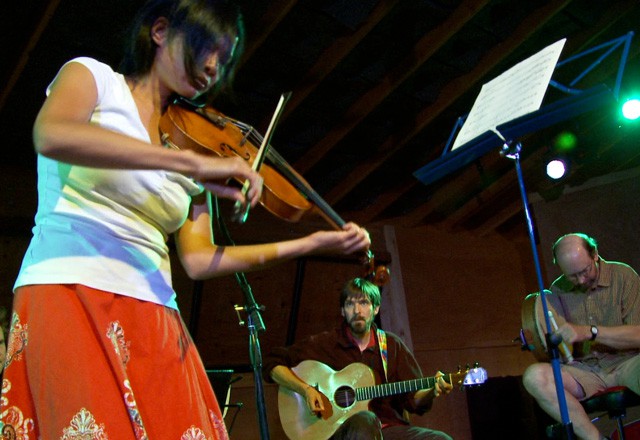
Min Tze Wu likes to break barriers.
She broke several when she founded Sounds of Lyons, a classical chamber music festival in one of the world capitals of bluegrass.
She overturned conventional expectations by taking the festival from zero to illustrious in only two years.
And she has done this with programming that defies all conventions. She has mixed classical masterworks with folk music. She has created concert programs that startle with unexpected juxtapositions. She has built entire programs around stories.
The third Sounds of Lyons, taking place Friday through Sunday, June 3-5, in venues around Lyons, will do all of these things — and do them, characteristically, in completely new and unexpected ways.
Friday’s opening concert is a new twist on the concert music-folk music pairing.
“We’re presenting a very interesting combination of folk, modern and Baroque instruments,” Wu explains. “We have banjo, guitar, nyckelharpa, a Swedish folk instrument, the [Baroque] viola da gamba and violin in this ensemble.”
For this eclectic group, Wu selected music by the most august of classical masters, J.S. Bach. The program will start with arrangements of three of Bach’s two-part inventions, known to all beginning piano students.
“The inventions will be sort of experimenting with the sound of the different instrument combinations,” Wu says. “And then we will put all five together to do the Art of Fugue.”
Art of Fugue is one of Bach’s most learned works, but Wu approaches the score with her usual adventurousness.
“Between parts of the Art of Fugue we will diverge to some Swedish music. It’s not a stark change of sound, and then you realize, ‘Ah! You are in the folk music world now.’ “The openness of the sound at the beginning of the Art of Fugue is really how the folk music starts as well. I am very fascinated with how they derive from very similar elements.”
But that’s only half of the concert. The second half — and there’s not space to describe all the surprises here — will focus on variations, with 17th century music, African music, American folk music and French concert music, sometimes enlivened with the group’s own variations.
Saturday night the festival will offer a more traditional string quartet concert: Beethoven’s Quartet in F minor, op. 95, Shostakovich’s unfamiliar String Quartet No. 7, and Benjamin Britten’s even less familiar Quartet No. 2. Here the theme — “War and Peace” — casts a new light on these highly personal works. None of them is overtly about war, but they feature internal struggles that will emerge as analogous to war.
“The central part of this program is Britten,” Wu says. “Britten is a pacifist, and for me the Second Quartet tells the horror of the war. And especially the final movement for me is the lingering song of the dead.
“I feel that he’s really dealing with how we survive with a kind of hope. Shostakovich is a very obvious choice for a companion [about] how we deal with our own war and our own peace. And then almost any Beethoven you could put in there, [but] we do Op. 95 because it’s just so tormented.”
About Sunday’s concert, Wu says, “This last musical journey is always in the Wildflower Pavilion at Planet Bluegrass, where we can play with the lighting, and it has that element of nature as well.
“This is the one concert that there is a kind of story line. It’s a concert without a plot or actors, but it has pretty distinct roles each instrument is playing, and it will be quite apparent to the audience what story we are trying to tell.
“The story is the earth before we came along, how we knew to be peaceful with it, how we departed from that, and to reflect this whole relationship of us as humanity and earth.”
Here, the framing element is a piano trio by Latvian composer Peteris Vasks, eight movements broken into four pairs separated by performances by solo flute, percussion and a simple chant sung by children. After a couple of brutal movements in the piano trio and a chaotic percussion piece by David Lang, a flute solo by South African composer Alexander Johnson returns to a more peaceful mood. The story closes with the final movements of the piano trio and what Wu calls “an end of time quality.”
The whole festival is unconventional, but Wu knows exactly why she wants it that way.
“I like to create a theatrical experience with music,” she says. “I love the music so much and I want to maximize its effect.”
Respond:[email protected]














